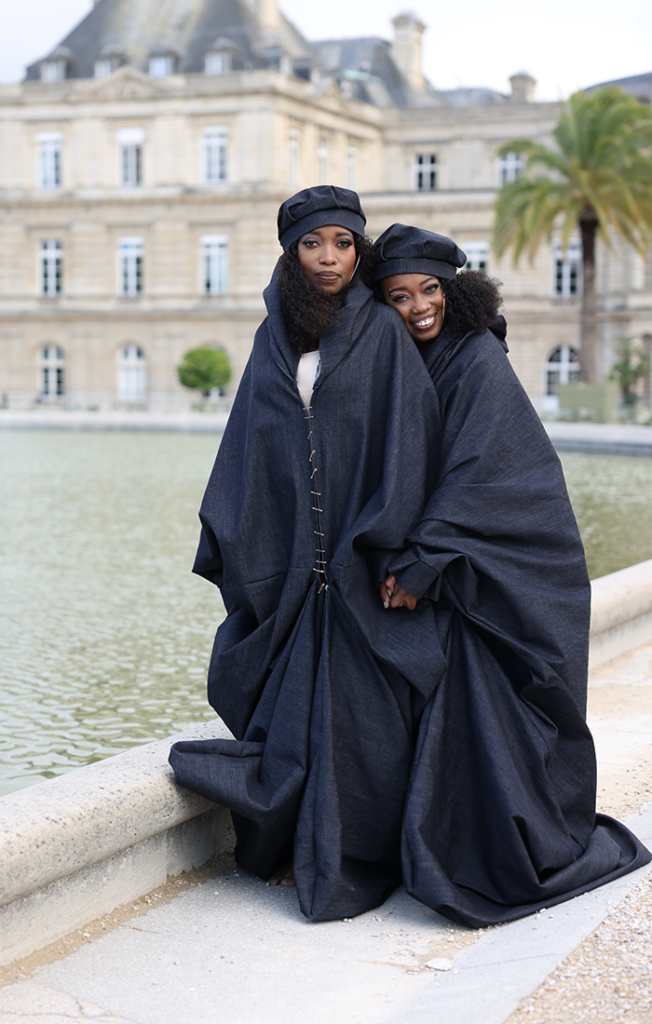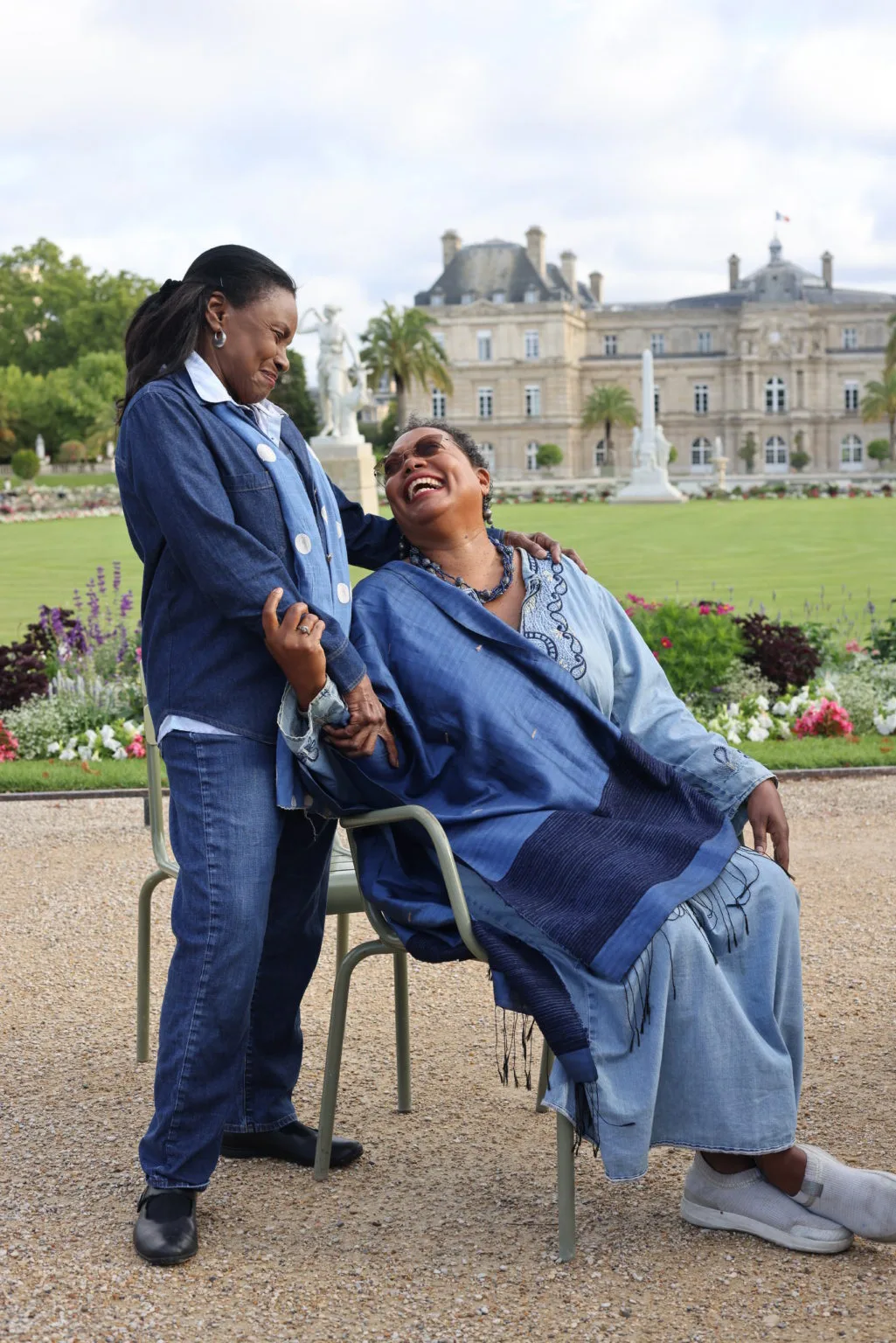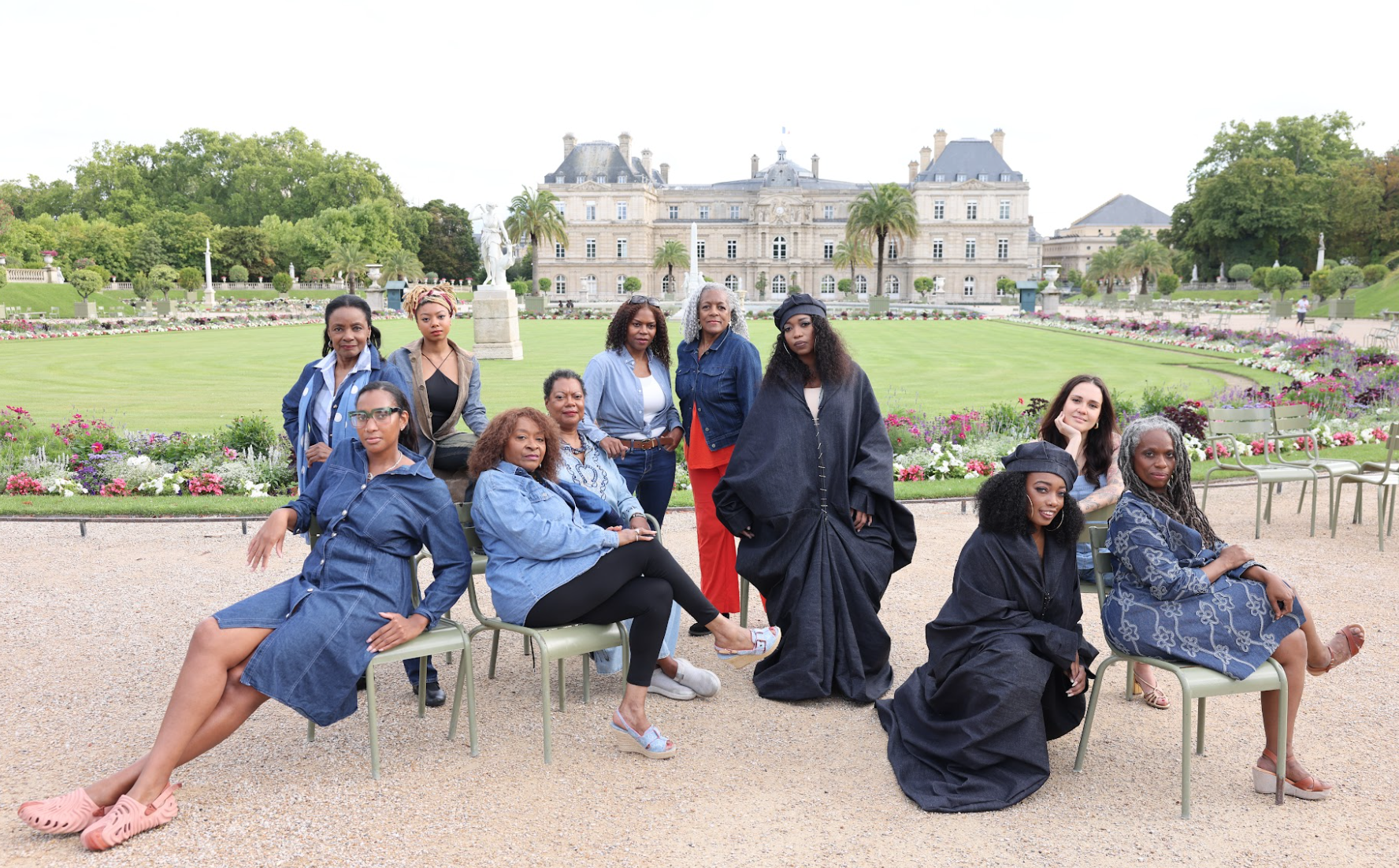
By Syreeta Martin
That was until it came into focus that there are actually three sisters and an expanding space for global sisterhood that is bigger than any one bookshop, in any one city. This story is just as much about who you don’t see, as who you do.
“I think because you mostly see me and Jazzy, folks don’t know that there are actually three of us,” says Jeannine Cook, writer and shopkeeper for Our Sister Bookshops. “Similar, yet different.”
Google Jeannine A. Cook and you’ll quickly learn that she’s a writer who owns Harriett’s Bookshop, in Philly; Ida’s Bookshop in Collingswood, NJ; and curates other bookshop installations celebrating women author, artists and activists including Toni Morrison, Marian Anderson, Alice Walker, and as of most recently in Paris, France, Josephine Baker. While Jeannine is the more visible face and voice of this work, it becomes very clear, very fast in conversation with her that the mission to prepare places for said celebration, is being done for sisters, by sisters.
Jeannine, a middle child, explains of the family’s eldest Jasmaine, youngest Jenielle and overall view of sisterhood, “I have two blood sisters–same mother, same father–and then I have a whole slew of sisters that I’ve picked up along the way. When I was growing up we would just claim someone as our godsister. I think that concept still applies today.”
 Photographed by Tezarah Wilkins.
Photographed by Tezarah Wilkins.
“In a way, there’s more freedom than what you might typically experience in the states–not that it’s impossible in the states, but just that it seems to come much easier being in Paris. Love yourselves. Love ourselves.”
Their childhood in Brooklyn, NY was a foreshadow. Dubbed “The Cook Sisters” by their Aunt Mamie–the three often dressed alike and were raised by their mother, Celia, a librarian who was passionate about books. The evolution of her senses from eyesight to blindness, led to a dependency of being read to by her children. Perhaps this stimulated their imaginations, taking them from hosting shows in the garage or at vacation bible school, to presenting workshops and building immersive bookshop experiences.
“I’ve always invited my sisters into my worlds and me into theirs,” says Jeannine. “I have heard Jazzy legit say, ‘I want to play!’ because in some ways being on this journey is like playing a very cool game.”
Though their ability to “play” together often translates into more space for others to join in, The Cook Sisters are serious about their work–which at any given moment requires them to shapeshift and fill integral roles in leadership, operations, sales, marketing, artistic curation, community engagement,
event production, advocacy, activism, and family dynamics. While their play fosters connection, it also provides historical context and clarity about what is not a game and not to be played with.
“Josephine Baker is your foremother. A creative warrior born in the early 1900s,” says Jeannine. “She literally and figuratively leapt around the world impacting culture…simply by being unapologetically herself.”
The installation of Josephine’s Bookshop in an art gallery located at 5 rue de Medicis in Paris, France isn’t Jeannine’s first foray into good trouble with a foremother. It’s how Harriett’s and Ida’s, named to honor Harriet Tubman and Ida B. Wells, managed to manifest amid a pandemic, racial reckoning, and in
predominantly white neighborhoods. While The Cook Sisters continue to answer ancestral calls, Ms. Baker’s would require much of what the famed dancer, singer, actress, and French spy did during
one of the most pivotal moments in her earlier life: a literal and figurative leap from Philly to Paris.
“Although there is no state mandated document that says these two cities are sisters, we know that doesn’t dictate how we choose our godsisters,” explains Jeannine. “We have a shared story, a shared history. Paris and Philly are similar.”
True to nature, each of The Cook Sister used their gifts and took the leap in their own ways. Jenielle, whom Jeannine describes as “an essential force” would do her part back in the states, caring for her nephew while his mother answered the call abroad.
“There was a period when our kids were almost raised as siblings–that’s how close we were. When Jeannine went to Paris, it was no different. I have always been there to support my sister,” says Jenielle. “I am just so proud and amazed at the things my sister is able to accomplish…she is like the captain showing the rest of the family how to navigate through the tides.”
There were months of advanced travel back and forth overseas to build connections and community across cultures, political and social climates, and logistical complexities–all while navigating language barriers.
“[Jeannine] was just like, ‘Jazzy, like, I can’t do this. If you’re not going to do it, I’m not gonna do it!’” says Jasmaine.
No pressure, right? Though Jasmaine tends to see her role as more of a supportive one to her younger sister, for Jeannine, there is a deep sense of shared ownership in the mission behind oursisterbookshops.com.
“[Jazzy] is multi-talented and multidimensional,” says Jeannine. “With her I can relay a vision and she catches it and she’s a great co-conspirator. I call her a human computer. She’s been telling me stories and reading me books since I was born.”
Leading up to and during the month-long installation, both sisters battled health complications. Despite best efforts to prepare her body for international travel, Jeannine landed in a Paris hospital for fevers and fever dreams. Jasmaine, who within the past year had a ministroke and diagnosis of chronic anxiety disorder, was healthy enough to say ‘yes’ to her sister’s request, though she too experienced illness in Paris.
Photographed by Tezarah Wilkins.
As Jasmaine’s health conditions caused self-doubt about her ability to show up in the ways her heart and her sister were accustomed to, Jeannine questioned herself about everything from her why, to
what she sacrificed as a mother, business owner, and visionary to see this call through. Nonetheless, the call persisted and their gifts made room for the stretch necessary to grow into the answer.
“I feel like I have to [do this]. I feel like: ‘Do you want to walk with Josephine?’ ‘Yes.’ Okay, let’s walk together. We start walking together, things unfold–it’s like a conversation, like a relationship. I agreed to walk with her and so that walk includes a lot of things,” explains Jeannine.
The walk was also risky. For example, Josephine’s launch required Harriett’s to simultaneously close for the month, and Jeannine to live out of an AirBnB. Not to mention their team only had one week to build and execute the installation. Again, no pressure.
Jeannine focused mainly on logistics, creative direction and cultivating community. “I invite so many people, everyone I can think of to come along on the journey and different people hop on and hop off at their leisure and they acquire different gifts along the way. I love that,” she says.
Using the sewing skills honed as a healing practice in her post-stroke recovery, Jasmaine shapeshifted into seamstress and designer of the denim, selected in honor of its symbolic connection to rebellion, seen on the walls of Josephine’s and the wardrobe featured in a photoshoot for this issue.
Women from near and far came together in the name of sisterhood to participate in carrying the torch of Ms. Baker’s legacy from July 1st to the 31st.
Sabreen Lateef, a Philly-native temporarily staying in Paris, direct messaged Jeannine and offered to help. Twenty-four hours before they opened on July 14th, recognized as Bastille Day, a national holiday marking the start of the French Revolution, Sabreen was there cleaning windows and preparing for opening day. Following the launch, she became a student of Josephine’s story and a witness to the bookshop’s impact.
“This has turned into a hug for a lot of the authors and creatives within the community. It’s been a little bit of a Paris Renaissance,” she says.
Tara Phillips, a Brooklyn-native and executive director of La Maison Baldwin, feels similarly. “Jeannine’s vision for Josephine’s Bookshop was realized almost immediately,” she says. “I visited the bookshop on multiple occasions and each time, I was mostly taken with how it drew in white French passersby who were magnetized by the spirit of community and love that only Black women conjure up in our special way.”
The feedback Jeannine received confirms this. “What I heard most was that Josephine’s is a desired space and a lot of people told us to continue—French folks, tourists, expats, etc. I think Black expats in Paris enjoyed a little taste of home when they were with us, while those unfamiliar with Black South Eastern American-ness got to experience that energy for the first time and it is intoxicating.”
A handful of Black women expatriates joined Jeannine and Jasmaine in the beautiful Luxembourg Gardens for extra helpings of home via a photoshoot celebrating sisterhood. They shared reflections and messages for sisters in the States.
Kathleen Dameron, a creator of “safe nurturing and innovative spaces for multicultural, multiracial dialogue work and living” has lived in Paris for over 40 years. She affirms, “It’s a city that has a long tradition of finding Black women beautiful and intelligent and admiring them. Posters of Black women, images of Black women being beautiful and the stars on buses through Paris…and that feels really good–it really does.”
Ursuline Kairson, a Chicago-native who shared that she is the longest, consistently running performance artist at any Parisian cabaret, has been a featured star on those posters and buses throughout the city. She offers a memory that encapsulates her message: An Atlanta-based professor
would bring students to visit and connect them with Black expats. During the last trip, Dameron asked the students what they took away from their experience. There was a young, Black woman whose revelation continues to resonate with Kairson.
“She no longer saw herself in the narrow confines that are prescribed in the states. Like, you are Black first and then you’re this…” says Kairson. “She began to see herself more as a human being first. Fine, I mean we are Black…you see yourself as what you are, we all have mirrors! But that is limiting. A color is not a human, humans have colors. You see what I mean?”
Veronica Tucker’s emphasis on the exploration of perspective indicates that she sees it. “You see that there’s so many different ways of being. In a way, there’s more freedom than what you might typically experience in the states–not that it’s impossible in the states, but just that it seems to come much easier being in Paris. Love yourselves. Love ourselves,” she says.
For The Cook Sisters, the self and selves go hand-in-hand, transcending time and space. And they both require a “yes” to love. “I want for my sisters what I want for myself,” Jeannine once wrote in a post on social media.
It would appear that what she wants for herself, is indeed what her sisters feel they need. “Creating spaces that deepen our connections is critical to our livelihood and they provide the foundation for us to do the work we need to do for those who come behind us,” says Phillips. “I feel tremendous gratitude for Jeannine for bringing a light to Paris that was very much needed.”
That light is sure to only grow in intensity as Jeannine feels the conversation with Ms. Baker is still unfolding. And she’s here for it.
“I’m feeling this concept of ‘going to prepare a place,’ which were Harriett’s last words and what feels like the current wave of our work and my art,” she says.
As for her message to our foremothers, Josephine, Harriett, Ida, and those they have yet to call forth?
“I say ‘thank you’. May our good deeds add on to yours.”
Love Now Magazine
This article originally appeared in the 2022 Fall issue of Love Now Magazine with the theme of Sisterly Love. You can read more stories like The Cook Sisters’ here.











